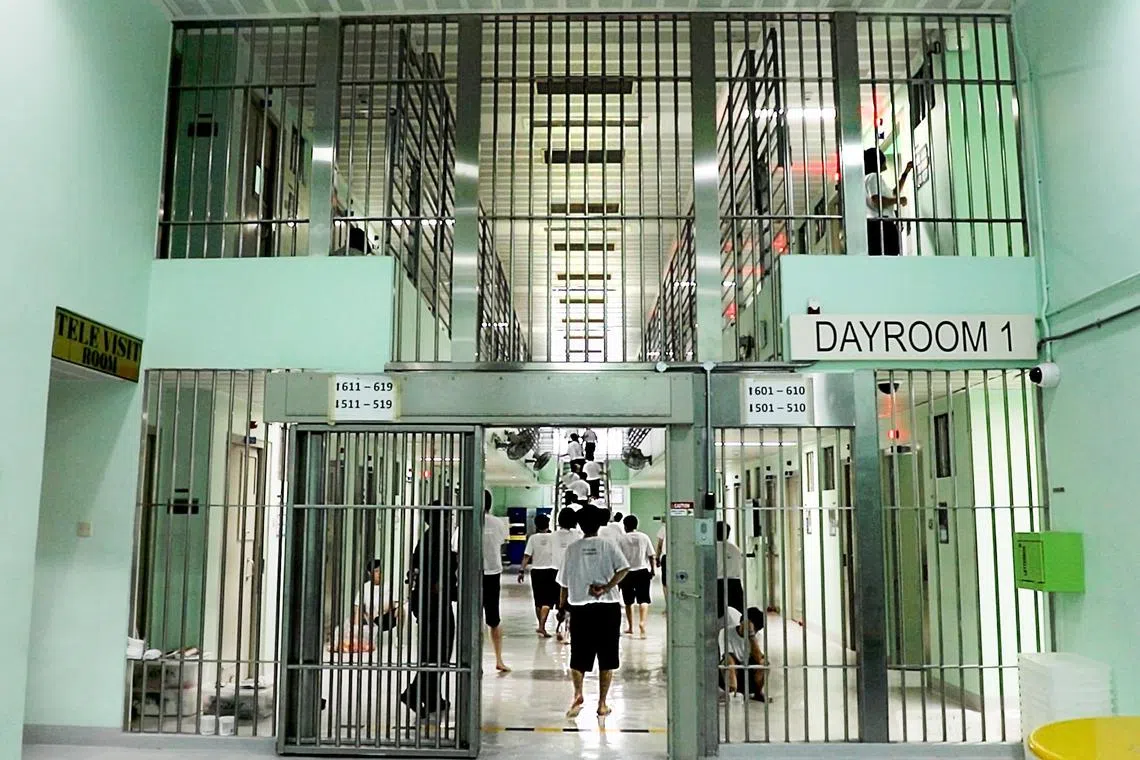Singapore Prison Service to study effectiveness of imprisonment, community-based corrections
Sign up now: Get ST's newsletters delivered to your inbox

New data and increasing use of community-based corrections have contributed in recent years to a lower rate of inmates reoffending.
PHOTO: LIANHE ZAOBAO FILE
SINGAPORE – A study will be launched to better understand the effectiveness of imprisonment and alternatives such as community sentences, with the data intended for use in regular reviews of prison policies and processes.
The costs and benefits of imprisonment will be re-evaluated in the light of new data and increasing use of community-based corrections, which have contributed in recent years to a lower rate of inmates reoffending.
The Singapore Prison Service (SPS) said in response to queries that the landscape surrounding corrections in the country has changed substantially since the last study was conducted in 2006.
SPS called for a tender on Feb 2 seeking a contractor to study the costs and benefits associated with the time offenders spend in custody and the period they spend in the community.
The aim of the study is to determine the effectiveness of various sentencing regimes such as short detention orders and long-term imprisonment on various kinds of inmates.
The information will be used to compute an economic measure of the regimes, said a tender document seen by The Sunday Times.
The document states: “The contractor shall... determine the economic benefits that corrections bring to both the individual inmate and the wider Singapore society.”
The contractor will also provide a review of at least eight countries or states to give a detailed understanding of the categories used elsewhere to determine the effectiveness of incarceration.
The categories include psychological pain, benefits of rehabilitation and suffering incurred by family members and victims of crime, it said.
In a statement, SPS said there have been substantial shifts in the system since 2006.
“For instance, compared with 2006, more inmates now serve the tail end of their sentence in the community (community corrections), where they receive structured support from SPS and our community partners,” it noted.
“Currently, there are about 3,000 inmates each year on community corrections, compared with fewer than 1,000 in 2006.”
The number of offenders in 2022 was 10,580, while the two-year recidivism rate for the 2020 release cohort was at 20.4 per cent, up slightly from 20 per cent for the 2019 cohort – a 30-year low.
SPS added that it has expanded its range of rehabilitation programmes as well as family-centred ones, which include religious programmes, employment-preparation initiatives and the provision of befrienders for inmates.
“These collective efforts have contributed to SPS being able to lower and stabilise the two-year recidivism rate, which is currently at about 20 per cent,” it said.
Recidivism refers to the tendency of a convicted criminal to reoffend.
The results of the study, which is to be completed within eight months of the contract being awarded, will be used in regular reviews of policies and processes, said SPS.
Litigator and criminal lawyer Johannes Hadi said it appears that the main purpose of the study is to subject all aspects of Singapore’s corrections regime to an economic cost-benefit analysis.
“This is good. Whatever we do in the name of crime control should be based on evidence, not sentiment,” he added.
He said that judging from recent statistics which suggest a decrease in the recidivism rate correlated with more inmates being placed on community-based corrections programmes, perhaps one aspect that is ripe for review is the efficacy of traditional incarceration versus alternative modes of corrections.
Mr Johannes, who is a partner at Eugene Thuraisingam LLP, said: “There are some who believe that community-based sentences are soft on crime. The evidence appears to point to the contrary.
“As the saying goes, it doesn’t matter if a cat is black or white, as long as it catches mice.”
He added that the study demonstrates SPS’ firm and evidence-based commitment to its mission of deterring crime and rehabilitating offenders for a safe Singapore, and the move is very much welcome.


